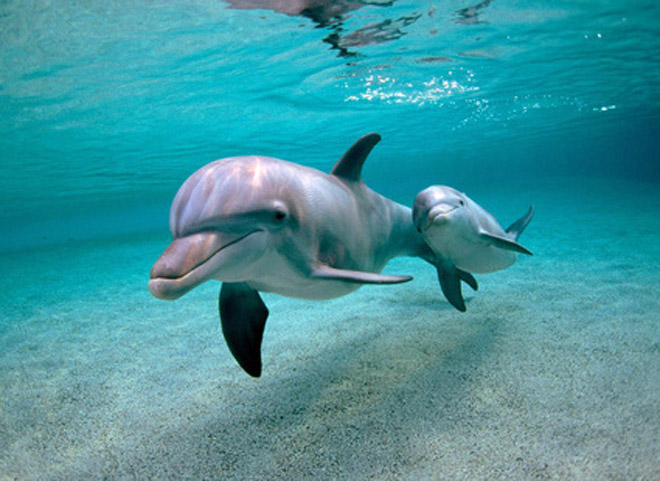Ever since the '60s US television show Flipper and the advent of live dolphin shows at theme parks, we've all known that dolphins are intelligent creatures.
Studies now reveal that the brain of a dolphin can be compared with that of a human and could even be its equal. This conclusion was reached based on research conducted by Lori Marino of Emory University in the US city of Atlanta, Georgia, who analyzed the grey matter of three large bottlenose dolphins (tursiops truncatus), dpa reported.
Relative to their size, dolphins have somewhat less brain mass than humans. But a dolphin's brain is more convoluted and has a greater surface area, which is a characteristic that could make up for the lesser brain mass. The convolutions mostly affect the functions of the neocortex, a brain structure that governs complicated thought processes and self-awareness.
The brain of no other species in the world is as convoluted as the brain of a dolphin, reported Marino at a meeting of the American Association for the Advancement of Science (AAAS).
While the intelligence race between humans and dolphins remains undecided for now, one loser has been identified. Great apes such as chimpanzees and gorillas have dropped back considerably compared with porpoises and other dolphins. The brain of an ape is only double the size of the average brain of other animals its size.
The brain of a dolphin is by comparison five times larger than the size that would be expected based on the size of its body. Compared to animals of similar weights, humans possess a brain that is seven times larger. Also, with respect to the structure and other characteristics of the brain, the most recent findings place great apes a distance third behind dolphins and humans.
"What does this mean?" asked Thomas White, an ethics professor at Loyola Marymount University in Los Angeles, speaking at the congress of the AAAS, the world's largest research organization. On the basis of a list of criteria White demonstrated that dolphins fulfil all requirements to be defined as individuals. They have positive and negative feelings, emotions, self-awareness and are capable of controlling their behaviour.
Dolphins recognize each other and treat each other respectfully when they meet, usually with open affection, White said, quoting numerous studies. They recognize themselves in a mirror, a capacity that, aside from dolphins, only humans and great apes have. They act analytically and methodically and solve complex tasks.
They also have the capacity to suffer emotionally and show physically that they are suffering. In addition their suffering can be intense and long-lasting.
This combination of mental capacity and vulnerability traditionally has been considered solely a human attribute. If dolphins have acquired this combination in the course of their nearly 60 million years of evolution, then rights similar to those claimed by humans should be available to the dolphin, the professor argued.
Then the dolphin couldn't be marketed "like a slave" at theme parks and it couldn't be hunted and slaughtered in the hundreds of thousands as in the eastern Pacific Ocean. This social mammal couldn't be viewed as property, rather it would have to be treated with respect.
Experts like White believe the dolphin offers humans a chance to develop ethics that bring about a change in the behaviour of humans towards other intelligent species.
Dolphins just behind humans in intelligence
Ever since the '60s US television show Flipper and the advent of live dolphin shows at theme parks, we've all known that dolphins are intelligent creatures.






